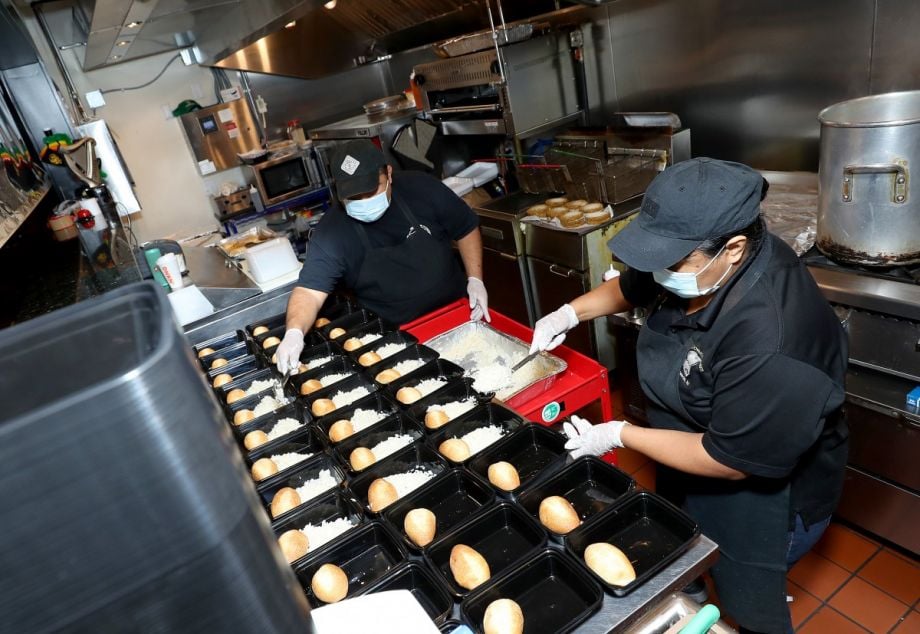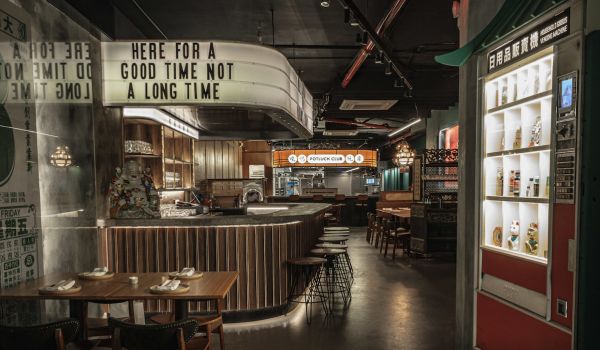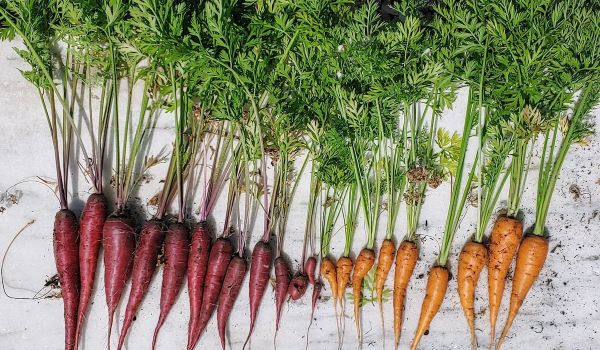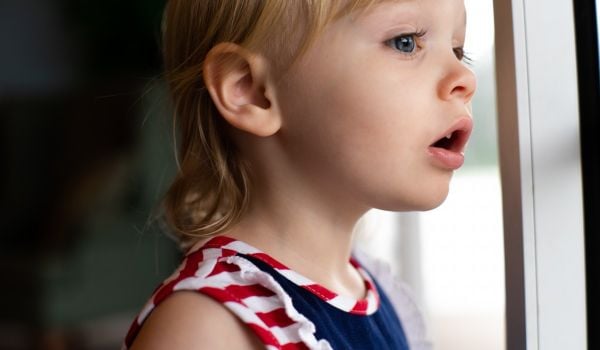At the height of COVID-19’s surge in Newark, N.J., the normally bustling dining district downtown was a ghost town. And now, even as vaccines are going into arms, face masks are coming off, and the economy hurries to return to something like normal, many small local businesses and families are still in survival mode. But both have found nourishment in Newark Working Kitchens, a program that pays local restaurants to prepare meals that community organizations distribute to people in need.
Newark Working Kitchens has been a lifeline for both struggling restaurants and thousands of people who didn’t know where their next meal was coming from. More than a year after the pandemic began, it’s continuing to sustain both eateries and people in a city where the pandemic exposed and exacerbated economic inequalities.
According to 2019 Census data, about a quarter of Newark’s population lives below the poverty line. Just under a third are foreign-born, and those without legal immigration status face additional risks: They are both more likely to work in professions affected by pandemic shutdowns and to be cut off from government aid that could help them survive. About half of Newark’s residents are Black, and more than a third are Hispanic or Latino – two groups who disproportionately suffered from COVID-19.
Newark Working Kitchens launched in early April 2020 with seed money from Audible and collaboration with D.C.-based charity World Central Kitchen and celebrity chef Marcus Samuelsson. It adapted World Central Kitchen’s model, paying restaurants $10 for every meal they created and working with community groups to serve them to Newark’s senior citizens, housebound and low-income residents. This month, NWK provided its 1 millionth meal.
The project’s continued success comes from its flexibility, its familiarity with the community, and the ways it was able to leverage existing relationships to customize its solutions.
Audible could have done what many companies did at the start of the pandemic – written a large check to a food bank or other nonprofit and left the solutions to them. But Audible, which has made nurturing partnerships with local government and businesses a core part of its mission, believed it needed to do more.
It recognized that sending its employees home to work remotely, at a time when other downtown Newark draws like the nearby New Jersey Performing Arts Center and Prudential Center arena were also closed, would have a huge impact on the businesses that relied on office workers as customers.
“We wanted to come up with an economic solution that didn’t feel like a philanthropic response,” said Audible’s Vice President of Urban Innovation, Aisha Glover. “Sustaining restaurants, retaining jobs and getting food to folks that need it the most is a model that we want to continue in other programs… we want to make sure we continue that in a holistic way.”
Glover said Audible has raised $11 million so far for NWK, from corporate sponsors like TD Bank, Rihanna’s Clara Lionel Foundation, and individual donors. About half of the funds came from Audible itself.
The partnerships Audible had built with local businesses in Newark are part of the reason why it was able to set up Newark Working Kitchens with such speed. Many of the restaurants involved in NWK had also been part of the company’s Lunch Out Wednesdays program, which gave employees $15 vouchers they could use to dine at places near the office. The pandemic hit days after it celebrated its 30,000th subsidized meal with that program.
“More than half of the participating restaurants in Newark Working Kitchens are minority- or women-owned,” Glover said. “Over 90 percent are locally owned or operated. That emphasis to be hyperlocal is important. Up to 80 percent of their workforce are Newark residents.”
Josh Miller owns and manages Robert’s Pizzeria and La Cocina, two downtown Newark restaurants that participated in the Lunch Out Wednesdays initiative and were among the first to sign up for Newark Working Kitchens. Miller says NWK is the reason he’s been able to keep 80 percent of his staff working during the pandemic.
At the start, they created up to 500 meals a day – everything from artichoke salad and lasagna to arroz con gandules and baked chicken. In the evenings, his workers prepared another 300 meals for exhausted health care workers too busy to leave their hospitals. As more eateries signed on to Newark Working Kitchens, Robert’s and La Cocina were able to scale back to about 500 meals a week.
“It was an amazing moment when we actually got on board,” Miller said. “It was like a ‘We’re going to be ok’ moment, and we kept having those moments over and over again.”
Miller said the diversity of Newark was top of mind when figuring out what to cook. Pork and shellfish were off the menu immediately – many locals don’t eat it for health or religious reasons. Salt and sugar were limited to accommodate diners with diabetes or heart and circulatory conditions. At first, 25 percent of the meals his restaurants provided were vegetarian, which was later dialed back to about 10 percent when they didn’t prove to be as popular as imagined.
For restaurants in downtown Newark, the revenue generated through NWK continues to be crucial. Although New Jersey has eased its pandemic dining restrictions, that doesn’t necessarily help its business district restaurants, which typically depend on office workers, students, and commuter foot traffic. And because the district is primarily commercial, restaurants can’t rely on residents for takeout or delivery orders.
For Miller, it’s hard to overstate the importance of Newark Working Kitchens for his restaurant and others in the neighborhood. He says it’s “completely saved” downtown Newark.
“If this program wasn’t there, it would just be completely boarded up. There wouldn’t be one survivor,” Miller said.
Newark community groups say the need for food and financial relief among residents remains largely unchanged, even as pandemic restrictions lift. Plenty of the jobs lost during the pandemic are not coming back. Moratoriums on evictions and utility service cutoffs are expiring. Debtors are less forgiving, and unemployment benefits are running out. For some, COVID-related medical bills – or burial expenses – are coming due. Even if someone didn’t fall ill themselves, they may have lost income when they had to quarantine or care for someone sick. And when people lost loved ones to COVID, they also lost emotional support, child care, and wages. Vaccines and medications don’t treat that kind of social and economic damage.
Vicky Hernandez, the executive director of the Ironbound Community Corporation, said the need for food exploded in the working-class Newark neighborhood her nonprofit serves when pandemic-related shutdowns began. The speed and flexibility with which Newark Working Kitchens filled that need set it apart, she said. And the need for healthy prepared meals hasn’t really let up since then.
When ICC set up child care and remote schooling help for the children of essential workers, the kitchens were ready to provide a daily meal and a snack the day after ICC approached them for help. And when ICC had delays setting up a permanent food service for the program, Newark Working Kitchens was able to keep sending meals to bridge the gap. Hernandez said the kids loved the restaurant-quality lunches, which were made with their food allergies and dietary needs in mind.
NWK also provided ready-made meals that ICC could hand out with its free grocery distributions, and the benefit of that went far beyond full bellies, said Hernandez.
“The cooked meals, beyond just being food, have been a treat. Here you are during this incredibly stressful time, and you don’t have to worry about making dinner for the night,” Hernandez said. “The psychological relief of not needing to do that one thing, because you were taken care of, was huge.”
Glover says the next step for Newark Working Kitchens is to see how its success can be used as a model for other communities and other issues: “How do we use moments like this to make continuing change and how do we not slip back into status quo, business as usual? How can we use that to really come up with transformative innovations and solutions?”
The state of New Jersey has seen NWK’s model as worth spreading. In February, the New Jersey Economic Development Authority announced $14 million in funding for NWK and 26 other groups across the state to keep cooking meals to those in need.
















